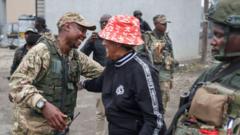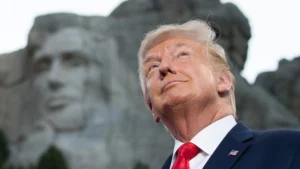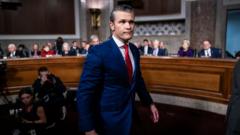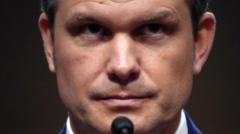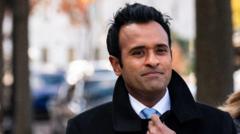In a groundbreaking speech at the National Museum of Slavery, President Biden became the first U.S. leader to visit Angola, highlighting the deep-seated historical connections forged through the transatlantic slave trade.
Biden's Historic Visit to Angola: Acknowledging the Past, Embracing the Future

Biden's Historic Visit to Angola: Acknowledging the Past, Embracing the Future
During his landmark visit to Angola, President Biden reflects on the painful legacy of slavery while advocating for a brighter future between America and Africa.
In a significant moment for U.S.-Africa relations, President Biden visited Angola, where he confronted the country's painful history rooted in the transatlantic slave trade. Speaking at the National Museum of Slavery in Luanda, he emphasized the crucial need to acknowledge the past in order to move forward, stating that the legacy of slavery defined America’s original relation with the continent. Scholars note that more enslaved Africans who were transported to the United States originated from this region than anywhere else.
Biden’s remarks served as a poignant reminder of the ongoing debates back in the U.S. regarding how history, particularly dark chapters like slavery, is taught and remembered in schools. Addressing attendees, including descendants of those enslaved in Angola, he urged for a transparent approach to history. “While history can be hidden, it cannot and should not be erased,” he said. “It should be faced. It’s our duty to face our history—the good, the bad, and the ugly.”
Referring to slavery as “our nation’s original sin,” Biden acknowledged the lingering shadows it casts over contemporary society. He stressed the importance of recognizing this history as a foundation for greater equality and understanding in the future. Despite America's struggle with this legacy, he affirmed that there is hope for a stronger relationship between the United States and African nations, built on a shared acknowledgment of the past and a commitment to progress.
Biden’s remarks served as a poignant reminder of the ongoing debates back in the U.S. regarding how history, particularly dark chapters like slavery, is taught and remembered in schools. Addressing attendees, including descendants of those enslaved in Angola, he urged for a transparent approach to history. “While history can be hidden, it cannot and should not be erased,” he said. “It should be faced. It’s our duty to face our history—the good, the bad, and the ugly.”
Referring to slavery as “our nation’s original sin,” Biden acknowledged the lingering shadows it casts over contemporary society. He stressed the importance of recognizing this history as a foundation for greater equality and understanding in the future. Despite America's struggle with this legacy, he affirmed that there is hope for a stronger relationship between the United States and African nations, built on a shared acknowledgment of the past and a commitment to progress.


